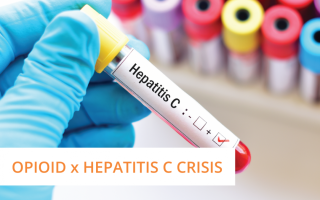Opioid x Hepatitis C Crisis
Aug 5, 2019 by Crossroads Recovery Center

Recently, research from the CDC suggests that a steep increase in acute hepatitis C infection is associated with increases in opioid injections. Hepatitis C is spread through bodily fluids, most commonly, infected blood. When addicts share needles, the virus is spread and is beginning to funnel a higher opioid and hepatitis crisis.
“Hepatitis C is a deadly, common, and often invisible result of America’s opioid crisis,” said Jonathan Mermin, M.D., M.P.H., director of CDC’s National Center for HIV/AIDS, Viral Hepatitis, STD, and TB Prevention. “By testing people who inject drugs for hepatitis C infection, treating those who test positive, and preventing new transmissions, we can mitigate some of the effects of the nation’s devastating opioid crisis and save lives.”
Historically, hepatitis C has primarily affected older generations who were prescribed opioids. That’s changing – as the opioid crisis widens, younger Americans are facing the same addiction issues and hepatitis C exposure linked to opioid abuse. While most of the 3.5 million people in the United States already living with hepatitis C are baby boomers, the sharp increase in hepatitis C is being seen in younger people (CDC). Additionally, there’s a steady increase in younger, pregnant women who are being exposed and infected with hepatitis C.
According to the Centers for Disease Control and Prevention, alarming, new data that shows that young opioid users are increasing their risks of infection – the youngest we’ve seen yet.
- 817 percent increase in admissions for injection of prescription opioids; and
- 600 percent increase in admissions for heroin injection. (CDC)
- 169 percent increase in admissions for injection of prescription opioids; and
- 77 percent increase in admissions for heroin injection. (CDC)
According to the Mayo Clinic, these are the main hepatitis C symptoms to look for:
While opioid addiction and hepatitis C require two different treatments, it’s important to seek help. Recovery centers, doctors, and rehabilitation centers offer treatment for both the addiction and the effects it has on your health. Crossroads Recovery Center of Louisiana commits to being a safe place to treat both your mental and physical health; it’s our passion to treat the entire patient. Our goal is to get you healthy, happy, and thriving – no matter where you are at the moment. The results of the studies by the CDC suggest that we provide interventions and deter opioid misuse as much as possible to avoid long-term, unavoidable health consequences that are life-threatening.
If you’re concerned that you’ve been exposed to hepatitis C or if you’re struggling with opioid addiction, visit https://crossroadsrecoverycenterla.com/ or call (225) 239-7088 to schedule a consultation.
“Hepatitis C is a deadly, common, and often invisible result of America’s opioid crisis,” said Jonathan Mermin, M.D., M.P.H., director of CDC’s National Center for HIV/AIDS, Viral Hepatitis, STD, and TB Prevention. “By testing people who inject drugs for hepatitis C infection, treating those who test positive, and preventing new transmissions, we can mitigate some of the effects of the nation’s devastating opioid crisis and save lives.”
Who does hepatitis affect?
Historically, hepatitis C has primarily affected older generations who were prescribed opioids. That’s changing – as the opioid crisis widens, younger Americans are facing the same addiction issues and hepatitis C exposure linked to opioid abuse. While most of the 3.5 million people in the United States already living with hepatitis C are baby boomers, the sharp increase in hepatitis C is being seen in younger people (CDC). Additionally, there’s a steady increase in younger, pregnant women who are being exposed and infected with hepatitis C.
According to the Centers for Disease Control and Prevention, alarming, new data that shows that young opioid users are increasing their risks of infection – the youngest we’ve seen yet.
- Among 18- to 29-year-olds, there was a:
- 817 percent increase in admissions for injection of prescription opioids; and
- 600 percent increase in admissions for heroin injection. (CDC)
- Among 30- to 39-year-olds, there was a:
- 169 percent increase in admissions for injection of prescription opioids; and
- 77 percent increase in admissions for heroin injection. (CDC)
Know the Symptoms
According to the Mayo Clinic, these are the main hepatitis C symptoms to look for:
- Bleeding easily
- Bruising easily
- Fatigue
- Poor appetite
- Yellow discoloration of the skin and eyes (jaundice)
- Dark-colored urine
- Itchy skin
- Fluid buildup in your abdomen (ascites)
- Swelling in your legs
- Weight loss
- Confusion, drowsiness and slurred speech (hepatic encephalopathy)
- Spiderlike blood vessels on your skin (spider angiomas)
How do I get treatment?
While opioid addiction and hepatitis C require two different treatments, it’s important to seek help. Recovery centers, doctors, and rehabilitation centers offer treatment for both the addiction and the effects it has on your health. Crossroads Recovery Center of Louisiana commits to being a safe place to treat both your mental and physical health; it’s our passion to treat the entire patient. Our goal is to get you healthy, happy, and thriving – no matter where you are at the moment. The results of the studies by the CDC suggest that we provide interventions and deter opioid misuse as much as possible to avoid long-term, unavoidable health consequences that are life-threatening.
If you’re concerned that you’ve been exposed to hepatitis C or if you’re struggling with opioid addiction, visit https://crossroadsrecoverycenterla.com/ or call (225) 239-7088 to schedule a consultation.

